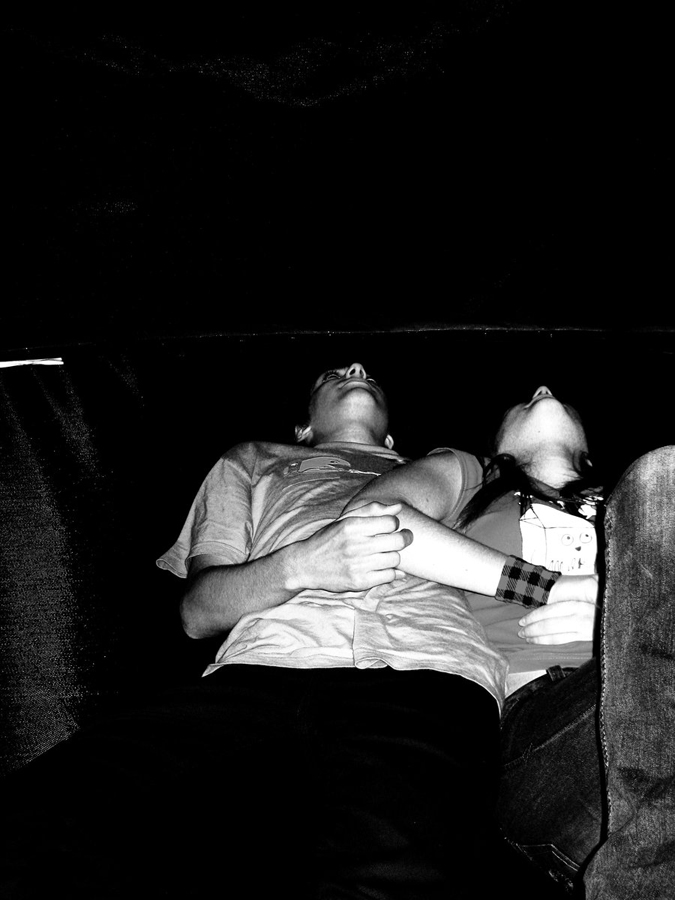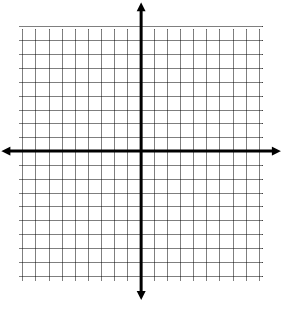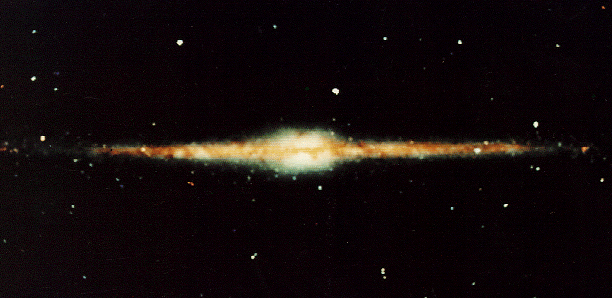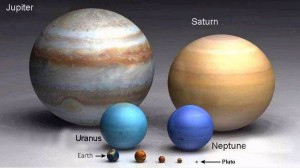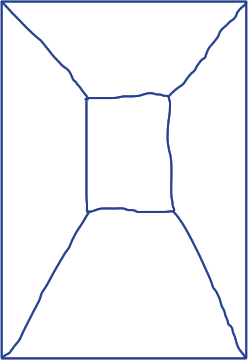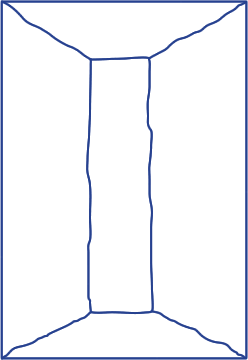When I heard about the powers of ten I thought it was some highly complicated scientific theory that you had to read really carefully and with much mathematical understanding to comprehend.
But in fact the ”Powers of Ten” is a 1968 American documentary short film written and directed by Ray and Charles Eames, re-released in 1977.
The film depicts the relative scale of the Universe in factors of ten.
It illustrates the universe as an arena of both continuity and change, of everyday picnics and cosmic mystery.
It presents the profound idea of orders of magnitude, with the subtitle of the film being:A Film Dealing With the Relative Size of Things in the Universe and the Effect of Adding Another Zero.
I want to show you one of the many remakes that have come up since 1968.
A little bit more cheesy, Americanized than the original with Morgan Freeman’s voice.
It shows the part of space we (humans) can see.
it’s stupendously big!!
Cosmic voyage – the power of ten HQ on YouTube
The theory of powers of ten tries to comprehend our world in numbers.
It fits everything from the atoms in our cells to the outer universe into a simple scheme of multipliing by ten.
By depicting this scheme the film gives a portrait of the various perspectives we can have on our world.
Our brain is capable to perceive the world on so many levels.
We can think a lot further than of what we actually know or have experienced, like the universe for example.
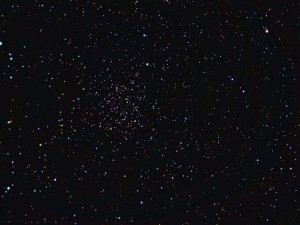
But we can as well think about the ungraspable development of thought .
Our brain can think about itself thinking.
There are many different levels of perceiving the world we live in.
Starting from ourselves I could think of the following levels:
The material level (what we consist of)
The personal level
The closer social level
The cultural (society level)
The global level (political/environmental)
The universal level ( seeing the world as a spot in the universe/ a world of constant change)
What matters to us changes violently depending on in which level we are thinking about things.
Looking at this matter the question arose what is actually important to us?
I guess its the things closest to us, the things on the personal or social level.
Not only because its the only thing that directly affect us, but also because its all we really know.
If we zoom out further we gradually just believe we know or understand things.
We trust in books, the press, people who say they know and if we zoom even further we trust machines and computers or merely theories of people who think how things are.
The whole matter is quite complex as our line of thought is horizontal AND vertical.
If I want to call the “Zoom in/ Zoom out” the vertical range of thought – imagine a y/x- graph- the horizontal would range from practical pragmatic,
To the poetic/philosophical thinking.But at the moment i want to focus on the zooming in and out of perspective so i will not further comment on ‘the horizontal’.
Another discovery i made is that on the lowest and on the topmost level the material and the universal, the importance of our human existence seems utterly small and irrelevant. If we realize how small we are it is hard to find reason in a lot of things we do.When the camera reaches its furthest vector, at 1025 or 100 million light years, the voyage stops for a moment, and the narrator says: “This lonely scene – the galaxies like dust, is what most of space looks like. This emptiness is normal. The richness of our own neighborhood is the exception.” And once the voyage back to Earth starts, the narrator comments: “Notice the alternation between great activity and relativity inactivity, a rhythm that will continue all the way into our next goal: a proton in the nucleus of a carbon atom beneath the skin on the hand of a sleeping man at the picnic.” He’s comparing the juxtaposition of galaxies and the vacuum of deep space, and the relatively vast distance between tiny particles at the atomic level.
This described emptiness is our inability to grasp those distances.We can read the numbers and understand what they mean but we can not feel what they mean.
There is a difference between knowing something and feeling something.
In the final stage of the film, they approach the carbon nucleus. The narrator says, “We are in the domain of universal modules. There are protons and neutrons in every nucleus, electrons in every atom, atoms bonded into every molecule out to the farthest galaxy.”
It is one of the last statements that Ray and Charles put on this film, and it’s a comment — not about the difference of things, as one might think at the start of the film — but about the universal sameness of things.You begin to understand Powers of Ten is much more than just a document representing orders of magnitude.
Also watching the film makes us realize how quiet small our limits of knowledge are.
As i said before we are able to think beyond our limits of knowledge but there is still much mystery preserved reaching those “unknown fields”.
Still we strive to go further.We invent new machines who calculate even more so called knowledge and we call it a success if we think to know what lies beyond the things we have thought we knew before.
This general trend is surely a good thing and it has probably led to really important inventions and discoveries in the past…
Still i want to question how far we really have to go
The human urge to know more and more and even more is good but
There are already so many things we still not quite understand on the personal and social and global level.
Before I asked myself how far scientists should go I asked myself how far they actually got in the last decades.
Beneath i put an extract from the article that I found researching this matter.
This article I found at the homepage discoverymagazine while I was googling about opinions on how far scientists should go with their research… Most of the articles were from the moral viewpoint stemcells, playing god etc.). But this didn’t interest me for my research. I thought that this article was interesting because many people don’t even know how far we already got exploring the universe.
How Far Have We Come, and Where Do We Go From Here?
The article is found at discovermagazin[x]: 'Universe on a Scale'
Physicist Saul Perlmutter vividly remembers what cosmology was like during his grad student days 25 years ago. “It was a standing joke that if you were within a factor of 10 with your measurements, you were doing well,” he says. Estimates of the universe’s age ranged from 7 billion to 20 billion years. It wasn’t a discipline renowned for exactitude.
Cosmology was reborn on November 18,
1989, with the launch of the Cosmic Background Explorer (COBE) satellite. COBE made the first precise measurements of the faint radiation left over from the Big Bang. According to theory, tiny quantum fluctuations were blown up to cosmic proportions within the first fraction of a second after the birth of the universe, creating lumps that seeded today’s galaxies and galaxy clusters. COBE found the imprints of those fluctuations, strong evidence for the standard model of the Big Bang. A second, even more shocking development came in 1998 from two teams of astronomers (one led by Perlmutter) studying supernovas in distant galaxies. They discovered that the expansion of the universe is
accelerating, driven apart by an enigmatic, all-pervasive property of space now called dark energy. “Will dark energy keep the universe accelerating faster and faster?” Perlmutter asks. “Or could it decay or even change and make the universe collapse?” Universe on a ScalePhysicist Saul Perlmutter vividly remembers what cosmology was like during his grad student days 25 years ago. “It was a standing joke that if you were within a factor of 10 with your measurements, you were doing well,” he says. Estimates of the universe’s age ranged from 7 billion to 20 billion years. It wasn’t a discipline renowned for exactitude.
Cosmology was reborn on November 18, 1989, with the launch of the Cosmic Background Explorer (COBE) satellite. COBE made the first precise measurements of the faint radiation left over from the Big Bang. According to theory, tiny quantum fluctuations were blown up to cosmic proportions within the first fraction of a second after the birth of the universe, creating lumps that seeded today’s galaxies and galaxy clusters. COBE found the imprints of those fluctuations,strong evidence for the standard model of the Big Bang. A second, even more shocking development came in 1998 from two teams of astronomers (one led by Perlmutter) studying supernovas in distant galaxies. They discovered that the expansion of the universe is accelerating, driven apart by an enigmatic, all-pervasive property of space now called dark energy. “Will dark energy keep the universe accelerating faster and faster?” Perlmutter asks. “Or could it decay or even change and make the universe collapse?”
So I don’t necessarily object to this kind of scientific research.
I just want to ask these simple questions:
What are use and consequences and who is actually affected by this search for knowledge? To what will millions spend on calculating distances in the universe lead us?
What and who will gain from it ?
Where does the urge to understand everything to the last extend really originate from?
Is it pure curiosity or is it the wish to “own” the world by squeezing it in numbers and printing it in our books yes by even selling the stars to each other.

